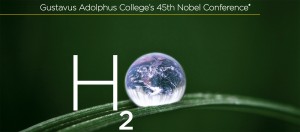
Early next week, time on the Gustavus campus will come to a screeching halt for all students, faculty and staff. Daily routines will be put on hold, the campus will flood with outsiders and for two days the college will, for the 45th consecutive year, commence hosting the Nobel Conference. As the Conference approaches, it is important to take time to reflect on the impact the event has on the greater community and why Nobel has become such an integral piece of Gustavus’ traditions.
We all know the basics of Nobel. Each year, classes more or less stop for a Tuesday/Wednesday in October, about 6,000 people travel to Gustavus and for those two days, the community is provided with the unique opportunity to listen to scientists (who have more official titles than we have letters in our names) speak about salient global issues.
“[The Conference] is the signature event of the College and is becoming known throughout the world,” Chuck Niederriter, professor of physics at Gustavus since 1985 and the director of the Nobel Conference said.
“For the last 25 years, I have attended or watched the overflowing seating at Nobel … Once I realized the incredible opportunity I had to learn from top scientists, philosophers and theologians, I just had to go,” Niederriter said.
Sandi Francis, a St. Peter resident and administrative coordinator for the education department, said that Nobel “makes science come alive with practical applications. It is a wonderful life-long learning experience for residents of the St. Peter area and gives a very different kind of learning opportunity with strong academic themes.”
How the material is presented seems to be one of the most defining characteristics of the Conference each year. It is not provided in a dry, monotonous and plodding discussion forum, but a lively consideration of a variety of different elements within a broader focus area.
While not all Gusties choose to participate in the opportunities that Nobel Week provides to the student body, they too recognize the importance of the Conference to the college.
“[Not only does] Nobel represent us in how Gustavus functions as an intellectual community that encourages debate and critical thinking,” Senior English Major Marlene Kvitrud said.
According to Kvitrud, one of the most exciting parts of the event for her is the “display of music ensembles, the evening concerts and the obvious appreciation of fine arts” that is part of the Gustavus personality.
While it is important not to forget the content of Nobel each year, it also important to remember how Nobel serves to reach out to the community.
The Conference reflects very positively on Gustavus as an academic community. “I remember seeing the Nobel posters in my high school classrooms and having the teachers talk about it. The number of students who hear about Nobel through high school definitely makes a difference,” Kvitrud said, a graduate of Irondale High School. Nobel can attract any student curious about the environment, global social issues, economics and a whole host of other topics. Throughout its history, the Nobel Conference has served as a platform for nearly 60 Nobel prizewinners.
“How many college students across the country can say they’ve been taught by a Nobel Laureate? … The College sees this as an important part of its mission, a major outreach program that is relatively unique,” Niederriter said.
Anyone who wants to attend is invited to listen to the speakers, ask questions, go to panel discussions and soak up what the annual topic has to offer.
This year, the Nobel committee has made an extra effort to reach out to St. Peter and the surrounding area. On Friday, Oct. 2, just days before the Conference, a gathering of almost 500 local elementary students, grades 4-6, will be coming to campus for a day of science centered around this year’s Nobel Conference theme, “H20: Uncertain Resource.”
Topics of interest for these students include the hydrologic cycle, fresh water aquatic systems, dam and channel engineering and water treatment and sanitation systems.
Dr. Michele Koomen, assistant professor in the education department, has spent a great deal of time with the Nobel committee working on developing and coordinating this program. “For about two years … through my work, I began to envision this day … linking together teachers and students in science and engineering,” Koomen said.
As part of this program, nearly 100 education majors will be involved in teaching the students their lessons throughout the day.
Nobel has become one of the most important traditions at Gustavus. “We were the first school — the only school — 45 years ago to be recognized by the Nobel Foundation in Sweden, permitting us to hold the Nobel Conference here,” President Jack Ohle said in a previously recorded interview. More than this, however, no event brings the Gustavus community together like Nobel.
Niederriter extended his gratitude to offices like Campus Safety, Marketing and Communications, Dining Services, Media Services, Print Services, Physical Plant and many more for their work. As a result of this collaboration, Nobel has some serious staying power at Gustavus. Not surprisingly, the topics for 2010 (Food and Nutrition) and 2011 (Neuroscience, Religion & Chemistry) have already been set.
If any student, faculty or community member has input on possible future topics for Nobel, contact Niederriter at chuck@gustavus.edu.